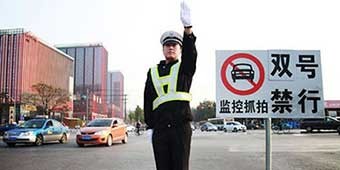The Chinese government is being criticized by its citizens for going overboard with the security and environmental measures it took for the Sept. 3 military parade in Beijing in commemoration of the 70th anniversary of the end of the People's War of Resistance Against Japanese Aggression, according to U.S.-based Chinese-language news outlet Duowei News.
For the military parade, which was attended by several foreign heads of state, the government implemented a long list of strict measures before, during and after the event to ensure its success. The event went without a glitch from 10:30 a.m. to 11:40 a.m. on Thursday.
The military parade used a coordinated effort involving public security, armed police, national security and a force of 850,000 volunteers.
Checkpoints prevented vehicles from entering Beijing.
Eagles and monkeys were reportedly trained to ward off birds and destroy nests to prevent them from interfering with the aircrafts flying over Tiananmen Square during the military parade.
To prevent a potential terror attack using mail bombs, courier services were put under much stricter restrictions than usual.
Tiananmen Square and Chang'an Avenue, where the parade took place, enforced curfews and forced shops and restaurants to close down.
To tackle the environmental issues in Beijing, restrictions were put on the sources of emissions in the city, as well as six of its neighboring provinces, cities and regions. Up to 80 percent of corporate cars were prevented from being driven and construction was halted in Beijing.
Many netizens have been up in arms, claiming the measures taken were over the top, excessively disrupting people's lives.
Critics have cited similar events in Russia, France and the United Kingdom that did not have to halt the daily lives of residents to such an extent. They also mentioned that the military parade ordered 1,927 businesses to close, 15 times more than the number of businesses affected during the APEC summit in Beijing last November
Businesses have complained of receiving no compensation for closing down during the parade.
According to Duowei, most people and businesses understand that some level of increased security had to be implemented for the success of the event. However, such measures became excessive when they disrupted the daily lives of people, destroying the significance of the celebratory activities.



























